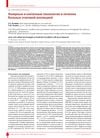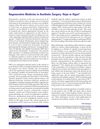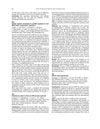 1 citations,
May 2017 in “InTech eBooks”
1 citations,
May 2017 in “InTech eBooks” The document explains the causes, types, diagnosis, and treatments of hair loss, and its psychological impact, especially on women.
 April 2024 in “Skin research and technology”
April 2024 in “Skin research and technology” Celebrity endorsements can greatly increase interest in cosmetic procedures.
 September 2023 in “Clinical, cosmetic and investigational dermatology”
September 2023 in “Clinical, cosmetic and investigational dermatology” A patient with a rare form of lupus improved after treatment for skin ulcers and hair loss on the face and scalp.
 June 2020 in “Medicinskij alfavit”
June 2020 in “Medicinskij alfavit” Laser and cell treatments effectively help hair regrowth in people with focal alopecia.
PRP hair treatment is generally safe but may cause minor pain, bleeding, redness, and scalp tightness, and isn't suitable for everyone.
June 2021 in “European journal of medical and health sciences” PRP therapy is a safe and effective treatment for hair loss.
 8 citations,
October 2022 in “Regenerative Therapy”
8 citations,
October 2022 in “Regenerative Therapy” New regenerative treatments for hair loss show promise but need more research for confirmation.
 January 2023 in “Springer eBooks”
January 2023 in “Springer eBooks” Using one's own blood platelets and fat can improve facial and hair appearance without surgery.

Topical finasteride accumulates in the skin with minimal absorption into the bloodstream.
17 citations,
May 2005 in “Hair transplant forum international” The study found that using growth factors from a person's own blood may help improve hair growth in baldness surgery.
 4 citations,
May 2023 in “JAAD case reports”
4 citations,
May 2023 in “JAAD case reports” Hyaluronic acid fillers for temporal lifting can cause hair loss without scarring.
 1 citations,
January 2014 in “Journal of Cutaneous and Aesthetic Surgery”
1 citations,
January 2014 in “Journal of Cutaneous and Aesthetic Surgery” Regenerative medicine shows promise for aesthetic surgery, but needs more research for widespread use.
October 2020 in “Вестник СурГУ. Медицина” PRP can help regrow hair and improve hair density in people with androgenetic alopecia.
 September 2020 in “British Journal of Dermatology”
September 2020 in “British Journal of Dermatology” The document highlights advancements and findings in dermatology, including AI use, disease prevention, treatment efficacy, and the impact of conditions on patients' lives.
Women with PCOS have different body composition and some metabolic differences compared to healthy women.
PRP therapy is effective and safe for treating hair loss, increasing hair follicles and reducing hair loss after at least 4 treatments.
PRP therapy is a promising hair loss treatment for people with alopecia.
August 2016 in “Anaplastology” The new controlled release PRP therapy shows promise for hair growth in women.
November 2021 in “Journal of Aesthetic Nursing” Injectable platelet-rich fibrin with microneedling is safe and effective for male hair loss but less supported than other treatments.
January 2018 in “Journal of Visualized Experiments” PRP injections significantly increased hair count and density with less pain.
 July 2023 in “JAAD International”
July 2023 in “JAAD International” Two drugs, finasteride and minoxidil, are approved for hair loss treatment, but new therapies are being developed.
 October 2021 in “Cosmoderma”
October 2021 in “Cosmoderma” Hair loss can be managed with treatments like minoxidil, finasteride, and others, but there are still gaps in effectiveness and off-label usage is increasing.
Injecting patients' own PRP into their thyroid improved thyroid function and symptoms in most hypothyroidism cases.
 July 2018 in “Hair transplant forum international”
July 2018 in “Hair transplant forum international” Different PRP systems produce varying levels of platelet concentrations.
PRP therapy at Ethos Spa improves hair growth and quality with minimal maintenance.
January 2017 in “Hair transplant forum international” PRP is effective for treating hair loss.
 May 2014 in “Transfusion and Apheresis Science”
May 2014 in “Transfusion and Apheresis Science” PRP is a safe natural treatment that improves skin by reducing wrinkles and enhancing texture for up to 4 months.

The document concludes that current treatments for androgenic alopecia are not fully effective, but new therapies like botulinum toxin and PRP show promise, and future gene therapy could be beneficial.
 August 2001 in “Veterinary Dermatology”
August 2001 in “Veterinary Dermatology” The meeting presented findings on effective treatments for various pet skin conditions and insights into the immune responses of dogs with atopic dermatitis.
72 citations,
March 2013 in “Primates” More research is needed to understand how diet affects isotope signatures in Japanese macaque tissues.
















